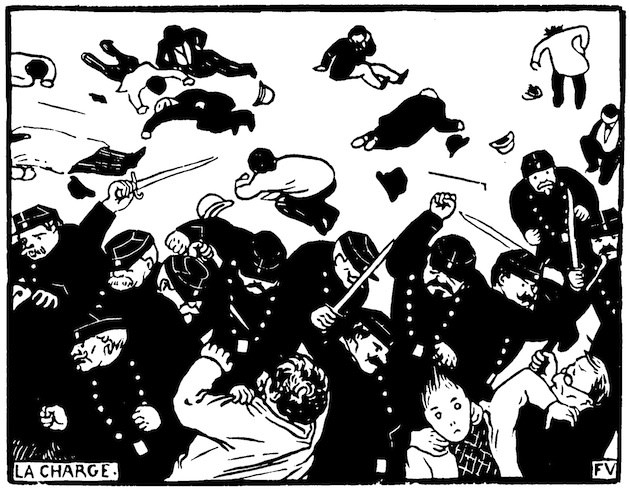
“Nothing ever changes” may be one of the truest things ever said. Certainly, life was different when our grandparents were young, in many ways far worse and in other ways far better—as they never failed to inform us every time some new, faddish invention came along. But despite all the predictions of social reformers and utopian thinkers, human behavior seems to have remained pretty much the same throughout recorded history. The four-thousand-year old admonition in the Code of Hammurabi that the strong be prevented from oppressing the weak, or Thomas Moore’s observation in the sixteenth century that society was a conspiracy of the rich to defraud the poor, are not only perfectly understandable today, but are aimed at the same problem that has brought demonstrators to the streets from Wall Street to Oakland. You’d think that the outsourcing of millions of jobs, the taking of away people’s homes, the stealing of their pensions, and the making of fortunes out of their tragedies would make Americans remember their family’s histories, the fact that so many of us started off as poor or persecuted. But, obviously, that’s not the case. It’s because we remember so little and prefer to be told fairy tales about our nation’s past that nothing ever fundamentally changes with us.
One only has to spend some time in a library, opening books at random and reading them a little, to discover what I have in mind. Here, for example, is a passage from the Chekhov story “Ward No 6” written in 1892 (and translated by Constance Garnett):
People who have an official, professional relation to other men’s sufferings, for instance, judges, police officers, doctors—in course of time, through habit, grow so callous that they cannot, even if they wish it, take any but a formal attitude to their clients; in this respect they are not different from the peasant who slaughters sheep and calves in the back-yard, and does not notice the blood. With this formal, soulless attitude to human personality the judge needs but one thing—time—in order to deprive an innocent man of all rights of property, and to condemn him to penal servitude. Only the time spent on performing certain formalities for which the judge is paid his salary, and then—it is all over. Then you may look in vain for justice and protection in this dirty, wretched little town a hundred and fifty miles from a railway station! And, indeed, is it not absurd even to think of justice when every kind of violence is accepted by society as a rational and consistent necessity, and every act of mercy—for instance, a verdict of acquittal—calls forth a perfect outburst of dissatisfied and revengeful feeling?
How familiar all of this sounds, I thought to myself. And yet, what two societies could be more remote than early twenty-first century America and late nineteenth-century Tsarist Russia? Nevertheless, the moment one recalls the two-and-a-half million people in our prisons, the three million Americans who lost their homes to foreclosure, and countless others who went bankrupt because of medical bills, none of it seems so remote. It takes the same kind of near-total indifference to the fate and suffering of disenfranchised people to make our own leaders and captains of finance resemble heartless Tsarist functionaries and our society the country Chekhov described.
Or one may open an anthology of twentieth-century American poetry in a bookstore and thumbing the pages come across the following poem by Robinson Jeffers (1887-1962) first published in 1926.
Shine, Perishing Republic
While this America settles in the mould of its vulgarity, heavily thickening
to empire
And protest, only a bubble in the molten mass, pops and sighs out, and the
mass hardens,I sadly smiling remember that the flower fades to make fruit, the fruit rots
to make earth.
Out of the mother; and through the spring exultances, ripeness
and decadence; and home to the mother.You making haste haste on decay: not blameworthy; life is good, be
it stubbornly long or suddenly
A mortal splendor: meteors are not needed less than mountains:
shine, perishing republic.But for my children, I would have them keep their distance from the
thickening center; corruption
Never has been compulsory, when the cities lie at the monster’s feet there
are left the mountains.And boys, be in nothing so moderate as in love of man, a clever servant,
insufferable master.
There is the trap that catches noblest spirits, that caught—they say—
God, when he walked on earth.
Does anything in this poem require any explanation for a contemporary reader? I very much doubt it. Only someone who has failed to notice that a country like ours is supposed to be governed by all of its people, who has never heard or given a thought to corruption in our political life or felt a hopelessness about our infrequent and usually maligned social protests—even when they gain as much support as the remarkable movement now playing out in cities across the country—and continues to believe in American exceptionalism, the still- enduring myth that we are the greatest people on earth whose values, political system and history are the object of universal admiration, will be puzzled by the poet’s rebuke. Others, like me, will close the book with a sigh and recall something our grandparents used to say: It’s the same old shit, only the flies change.
Advertisement


